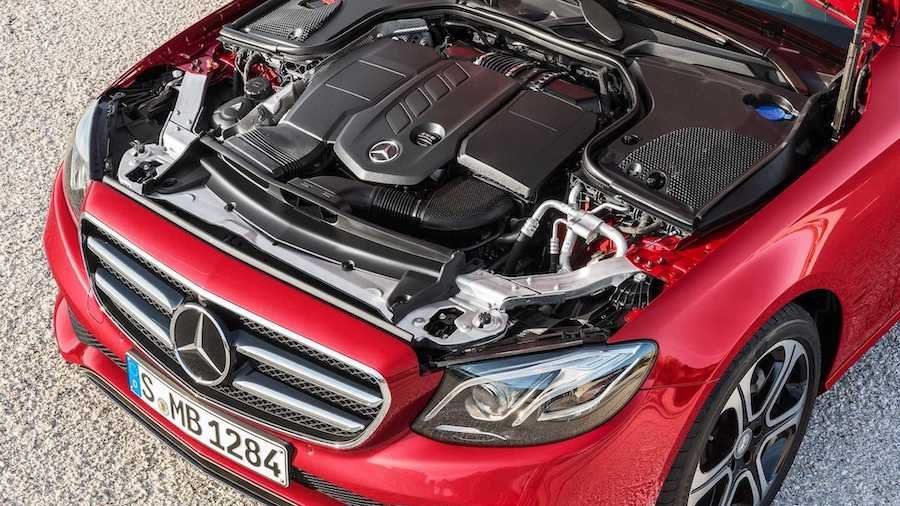Mercedes accused of using defeat devices on diesel cars

New allegations of diesel emissions manipulation have been levelled against Daimler after a German environmental group claimed to have found eight new ‘defeat devices’ in a Euro 6-classified Mercedes-Benz E-Class.
The Deutsche Umwelthilfe (DUH) organisation discovered that emissions of poisonous nitrogen oxide (NOx) spiked by up to 500% during tests of a 2016 Mercedes E350d Bluetec.
Mercedes parent firm Daimler has previously been forced to recall 774,000 diesel cars after German KBA association found “unauthorised defeat devices” in four-cylinder diesel engines with an SCR filter using AdBlue to reduce emissions. The recall affected around 90,000 cars in the UK.
Daimler argued at the time that car makers are permitted to switch off the SCR filter in diesel engines in the interests of engine longevity. However, critics have argued that car makers have used loopholes in the rules to make cars appear clean in laboratory tests while allowing significantly higher emissions in normal driving.
DUH claimed six of the defeat devices found on the six-cylinder engine in the E350d related to the SCR filter system, reducing the amount of AdBlue cleaning fluid used, while two affected the vehicle's exhaust gas recirculation system.
DUH said its tests related to a single model but would be relevant to other vehicles using the same engine, citing the ability of manufacturers to use the same registration data for a particular engine across a number of different models. Model lines using the OM642 engine with the Bluetec SCR system, for example, include the E-Class, GLC, GL and G-Class.
DUH did not give a figure for the cars affected but estimated the “vast majority” of diesel passenger cars with Euro 5 and early Euro 6a and 6b versions of the six-cylinder engine will be affected.
“Daimler couldn’t plausibly claim that the defeat devices were needed for engine protection,” said Jürgen Resch, federal managing director of DUH. “The reason is as simple as it is cynical: it is about maximising profit at the expense of the environment and the health of the city dwellers.” Daimler denies these allegations.
Two of the defeat devices depend on what DUH called an "ageing factor" that lowers the point at which the shutdown devices start. In two cases, this happens after just 1% of the vehicle’s life expectancy, within a few thousand kilometres. A further reduction occurs after around 20% of vehicle life.
Another defeat device was activated when the driver selected Sport mode, reducing the amount of AdBlue fluid the exhaust system used to clean emissions. “This I would consider fraud,” Resch said.
Previous defeat devices have been focused on emissions reduction at lower temperatures.
DUH’s report was funded by the international law firm Milberg, which is leading class action lawsuits on behalf of owners in Europe.
A Mercedes spokesperson told Autocar: “In our view, these are not to be assessed as illegal defeat devices in the interaction and overall context of the highly complex emission control system.
“The vast majority of rulings in German regional courts and higher regional courts continue to be in Daimler's favour. In approximately 95% of cases, the courts rule in favour of the company.
“At the regional court level, there are more than 15,500 decisions dismissing lawsuits in favour of the company. In only about 900 cases was the decision against the company.
“There are now around 900 decisions in our favour at the higher regional courts and only three decisions against us.
“The German Federal Court of Justice (BGH) has also confirmed key points of Daimler AG's legal opinion in several decisions.
“In particular, the Federal Court of Justice (BGH) has held in these and other decisions that an allegedly inadmissible defeat device in the engine control unit alone does not give rise to a claim for damages.”
In the UK, Mercedes owners are being invited by law firm Slater Gordon to participate in a class action lawsuit aimed at reclaiming damages from Daimler.
Car makers including the Volkswagen Group, Renault, Nissan, Volvo, Fiat and Jaguar Land Rover have been dogged by claims in Europe that they sought to reduce the effectiveness of diesel emissions reduction systems as the need to reduce tailpipe poisons grew ever tougher.
The VW Group’s manipulation was exposed by US regulators in September 2015 in a scandal that has so far cost the company more than €30 billion (£27 billion). The fallout continues to rumble on today as owners seek to recover damages.
